#<- everyone loves to critique him for supposedly treating this like ‘just a job’ but i mean
Explore tagged Tumblr posts
Text
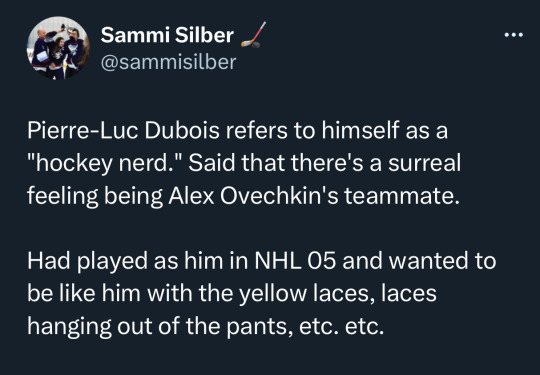
me when i admit to being normal about my new captain
#hockey nerd… tracks#pierre luc dubois#going through his old media. did you know he used to review his game tape#did weeks and weeks of strength and conditioning on his own prior to camp… hired a coach to run drills and everything#i wonder what happened to that kid. why no one talks about him anymore#well. probably not convenient for the media to sell 2 different stories at once..?#or maybe he just realised there’s more in this life than hockey..?#<- everyone loves to critique him for supposedly treating this like ‘just a job’ but i mean#reading his old interviews… it kinda looked like he was on track to being a hockey robot made for nothing else#and that still didn’t save him..? so. u know#washington capitals
21 notes
·
View notes
Text
bojack horseman and bo burnham: the art of acting like you’re acting and the comedy of misery
at the core of bojack horseman, raphael bob-waksberg’s 2014 comedy, is a story about the relationship between performance and depression. the protagonist of this renowned tragicomedy is best described as a sympathetic villain; he is shown to clearly be in the wrong across various events of the show, and is explicitly referred to as a bad person, but the audience is granted deep access to his personal struggles, resulting in some portions of the audience finding themselves on bojack’s side. the duality of his character is complex, but can be broken down into some core components, that all stem from the impacts of stardom and performance. the standup comedy of bo burnham arguably echoes this sentiment in real time. having been a performer from a young age, burnham creates work that serves as a satirical commentary on the life of entertainers. he uses original songs to explore the reliance upon and resentment for his performative nature both onstage and within his personal life. both the comedian and the netflix show are widely understood to be thinly veiling their critiques of the entertainment industry behind a particular brand of witty and absurd humour.
both bojack and burnham’s content openly criticises their audiences and explicitly states the manufactured nature of the narrative the audience is fed. in the fifth season of bojack horseman, the show satirises itself by having bojack star in a police procedural drama, parts of which are actively written by other characters to reflect events of bojack’s life. the titular character he plays, philbert, is the epitome of selfish male angst, and an example of what bob-waksberg’s show could have been; another story about a sad and angry man whose guilt supposedly makes up for the people he has hurt. according to bojack, philbert teaches us ‘we’re all terrible, so we’re all okay’, an interpretation that is harshly disputed by diane: ‘that’s not the point of philbert, for guys to watch it and feel okay. i dont want you, or anyone else, justifying their shitty behaviour because of the show.’ this moment is a direct reaction to some of the online reception bojack horseman has received. various circles of the show’s fanbase have found themselves relating to the protagonist to the point of defending his untoward behaviour, a response not intentioned by the show’s creators. this is not the only example of bob-waksberg’s ability to make his work self-evaluative. in season six’s exposure of bojack and sarah lynn’s problematic relationship, characters question their sexual encounter from the first season. the writers use this as a way of examining their own choices, and the harmful tropes they played into when using this exploitative sexual encounter as a gag. this self-evaluative quality is what sets bojack apart as a show that assesses the performance it participates in, much like the comedy of bo burnham.
bo burnham is known for directly addressing his audience, particularly in terms of discouraging idolisation and parasocial relationships. some examples of this manifest as responses to hecklers rather than a planned bit in the show, for instance:
heckler: i love you!
bo: no you don’t
heckler: i love the IDEA of you!
bo: stop participating!
he actively addresses the issues posed by being an entertainer, and encourages the audience to understand and recognise that his onstage persona is just that: an exaggerated persona. not once does burnham claim to be fully authentic onstage, and even moments of authenticity we see in his latest special, inside, are staged. we make the assumption that having the physical setting of a stage stripped away grants us a more personal look at the entertainer’s life, but he makes it clear that even in his own home we still see the aspects he has carefully constructed rather than the full truth. arguably though, parts of the show really are authentic; in his monologue during make happy, bo deconstructs his own show in a way that is similar to bojack horseman’s later seasons, admitting that all he knows is performing and thus making a show about the more mundane and relatable aspects of life would feel ‘incredibly disingenuous.’ in his attempts to separate himself from this onstage persona he actually manages to blur the lines between what is acting and what is now part of his nature as a result of his job. this notion is echoed in bojack horseman as bojack’s attention seeking nature is attributed to his years acting in front of a camera every day.
bo suggests that the era of social media has created a space in which children’s identities mimic that of an entertainer like himself, describing the phenomenon as ‘performer and audience melded together.’ in this observation he criticises the phenomenon. bo attempts to force the audience to recognise the ways in which their lives are becoming shaped by the presence of an audience and to some extent uses his own life as a warning tale against this. he points out the way in which the ‘tortured artist trope’ means that your cries for help or roundabout attempts of addressing mature themes such as substance abuse, mental illness and trauma become part of that on stage persona and therefore become part of the joke. both bo and bojack address these topics in more discrete manners earlier in their careers, but this eventually becomes expected, and thus they are forced to explicitly detail their struggles with these topics in order to be taken seriously. even then, portions of the audience are inclined to see it as part of the persona or as something that fuels the creators creativity and thus does not need to be addressed as a legitimate issue. the emphasis on creating a character or persona promotes the commodification of mental illness: any struggle must be made into a song or a joke or a bit, must be turned into part of the act in order to have value. this actually serves to delegitimise these emotions and create a disconnect between the feeling and the person, as it becomes near impossible to exist without feeling as though you are acting. even when an artist’s cries for help become blatant, they continue to go ignored because now they serve the purpose of creating content that criticises the industry they stem from. online audiences can be seen as treating bo burnham and his insightful work as existing to demonstrate the negative effects entertaining can have, and because this insight is useful or thought-provoking to audiences, he is almost demanded to keep entertaining and creating. in response to this demand, his work becomes more meta and his messages become clearer, and the more obvious his messages, the more people he reaches. this increases audience demands and traps entertainers in a cycle fraught with internal conflict.
during bojack’s second season, bojack’s date asks him, ‘come on, do that bojack thing where you make a big deal and everyone laughs, but at the same time we relate, because you're saying the things polite society won't.’ this moment exemplifies how aspects of his genuine personality have now become a part of his persona and this is demanded of him in genuine and serious situations, undermining the validity of his emotional reactions. he immediately makes a rude comment to the waitress at the restaurant they’re in and satisfies his date by performing that character he has set himself out to be. some circles of the fan base have argued that bojack is written as a depiction of somebody with borderline personality disorder, offering a psychoanalytical lens through which to view this notion of performance. a defining symptom of borderline personality disorder is a fluctuating sense of self; having grown up on camera, being demanded to perform to others as young as six years old, bojack’s sense of self will have been primarily dictated by the need to act. whether this acting is for the sake of comedy, or as a representation of masking his mental illness, when they need to act is taken away bojack entirely loses his sense of self and relapses into his addictions: ‘i felt like a xerox of a xerox of a person.’ burnham’s depictions of depression run along a similar vein; in his new special he poses the idea that his comedy no longer serves the same personal purpose it once did for him. he questions ‘shit should I be joking at a time like this?’ and satirises the idea that arts have enough value to change or impact the current global issues that we are facing. burnham’s ‘possible ending song’ to his latest special, he asks ‘does anybody want to joke when no-one’s laughing in the background? so this is how it is.’ implicit in this question is the idea that when the audience is taken away and there is nobody to perform his pain to, he is left with his pain. instead of being able to turn his musings and thoughts into a product to sell to the public, he is forced to just think about them in isolation and actually face them, an abrupt and distressing experience.
the value of performance and art is questioned by both bojack and burnham, particularly during the later years of their respective content. burnham’s infamous song, art is dead, appears to be a direct response to the question ‘what is the worth of art?’ he posits that performing is the result of a need for attention (‘my drug’s attention, i am an addict, but i get paid to indulge in my habit’) and repeatedly jokes throughout his career that the entertainment industry receives more respect that it deserves (‘i’m the same as you, im still doing a job or a service, i’m just massively overpaid’). his revelations regarding the inherent desire for attention that runs through all entertainers is frequently satirised in bojack horseman. bojack is comically, hyperbolically attention hungry and self-obsessed, and the show has a running gag in which he uses phrases along the lines of ‘hello, why is nobody paying attention to me, the famous movie star, instead of these other boring people.’ his constant attempts to direct the focus of others towards himself result in bojack feeling like ‘everybody loves you, but nobody likes you.’ his peers buy into his act and adore the comical, exaggerated, laughable aspects of his character, but find very little room to respond to him on a genuinely personal level because of this. interestingly, bojack appears to enjoy catering to his audience and the instant gratification it produces, whereas bo burnham becomes increasingly candid about his mixed feeling towards his audience. ‘i wanna please you, but i wanna stay true to myself, i wanna give you the night out that you deserve, but i wanna say what i think and not care what you think about it.’ he admits to catering to what audiences want from him, but resents both the audience and himself in the process as it reveals to himself which parts of his character are solely for the sake of people watching him.
within bojack horseman, this concept is applicable not only to the protagonist, but to the various forms of performer demonstrated in the plot. towards the show’s end, sarah lynn asks ‘what does being authentic have to do with anything?’ to which herb kazzaz responds, ‘when i finally stopped hiding behind a facade i could be at peace.’ this highlights the fact that because entertainers are demanded to continue the facade, they do not receive the opportunity to find ‘peace.’ this sentiment is scattered throughout the show, through a musical motif, the song ‘don’t stop dancing.’ the song stems from a life lesson bojack imparted to sarah lynn at a young age, and becomes more frequently used as the show progresses and bojack’s situation worsens.
sarah lynn is also used to explore the value of entertainers; in the show’s penultimate episode, she directly compares her work as a pop icon to the charity work of herb, arguing that if she suffered in order to produce her work. it has to mean something. she lists the struggles she faced when on tour: ‘i gave my whole life...my manager leaked my nudes to get more tour dates added, my mom pointed out every carb i ate, it was hell. but it gave millions of fans a show they will never forget and that has to mean something.’ implicit in this notion is the idea that entertainment is the epitome of self-sacrifice. there is a surplus of mentally ill individuals within the industry, largely due to the nature of the industry itself, but some may argue that the cultural grip the industry has, and the vast amounts of respect and money it generates annually, gives the suffering of these prolific individuals meaning.
the juxtaposing responses entertainers feel towards their audiences manifest as two forms of desperation: the desperation to be an individual who is held accountable, and the desperation to be loved and validated. we see both bojack and bo depict how they oscillate between ‘this is all a lie’ and ‘my affection for my audience is genuine’, or between ‘do not become infatuated with me im a character’ and ‘please fucking love my character i do not know how to be loved on a personal level.’ bojack explicitly asks diane to write a slam piece on him and ‘hold him accountable’, similar to bo’s song ‘problematic’ in which the hook includes the phrase ‘isn’t anybody gonna hold me accountable?’ for his insensitive jokes as a late teenager. their self-awareness is what enables their self-evaluative qualities, but self-awareness is its own issue. bojack grapples with a narcissistic view of his own recognition of his behaviour before settling on a more nuanced, albeit depressing take. originally he makes the assumption that in recognising the negative aspects of himself, he is superior to those who behave similarly: ‘but i know im a piece of shit. that makes me better than all the pieces of shit that don’t know theyre pieces of shit.’ eventually, during his time at rehab he is forced to reconcile with the fact that self awareness does not, to put it bluntly, make you the superior asshole, it just makes you the more miserable one. the show does, however, make a point to recognise how the entertainment industry protects ‘pieces of shit’, prioritising their productive value over how much they deserve to be held accountable, demonstrated using characters like hank hippopoalus. the show itself obviously stems from the entertainment industry, as it is a form of media produced by netflix, one of the most popular streaming platforms available. bojack horseman and bo burnham represent the small corner of the industry that is reflective enough to showcase the damage it inflicts. this is powerful in terms of education and awareness, and urges audiences to question their own motives and versions of performance, but the reflection alone is not powerful enough to help the artists in question. burnham’s candid conversations surrounding his mental health continue to reveal a plethora of issues somewhat caused or sustained by the nature of his career. within bojack horseman, bojack is only able to stop hurting other characters when those characters construct a situation that forces him to face consequence, his introspection alone is not enough. while bojack ends on a message of hope, suggesting to the audience that reverting back to the status quo is not the only acceptable way for events to end, it leaves stinging lessons and social commentary with the audience regarding the unnatural and damaging narrative that performers live through. on a similar but markedly different note, bo burnham’s work and personal progression is playing out in real time, and not in a way that is as raw and genuine as it appears. each bit is planned, even the most vulnerable moments that appear unplanned and painful. his latest special is not entirely devoid of hope, but does translate to audiences as a somewhat exaggerated look around the era of social media and the development of performance, using himself as an example.
the absurdist humour that often acts as a vehicle for poignant statements or emotionally provocative questions is very specific to each media creator. bob-waksberg’s use of puns, tongue twisters and entirely ridiculous circumstances served to simultaneously characterise his points as an expected part of the show’s style of humour, similar to bojack’s emotional instability, but also to make them appear gut-punching in comparison to the humour. burnham’s work is similar in that poignant but blunt statements are often sandwiched between absurd and exaggerated jokes, making them stand out via contrast but not giving the audience too much time to dwell upon them as they are said. performance art is second nature to entertainers, and is presented a an issue that is infiltrating the general population via social media rather than solely affecting the ‘elites’. bojack horseman and bo burnham present the duality of artists simultaneously attempting to level the playing field and increase their chances of survival in the industry, and encourage audiences to know that everyone is bluffing and you’ll never have the right cards anyway.
i.k.b
#mine#bo burnham#bojack horseman#bojack analysis#bo burnham analysis#comedy#essay#analytical essay#diane nguyen#sarah lynn#inside bo burnham#make happy#bo burnham what#long post#bojack rewatch#bojack ending#bo burnham netflix#bo burnham special#bo burnham my beloved#bjhm#satire#raphael bob-waksberg#netflix#netflix special#original essay#copyright ikb#reblogs appreciated!
738 notes
·
View notes
Text
Normal world AU where the different buildings are just random groups of people and all of them ended up moving to the small village near the supposedly ‘haunted’ mountain that Samon and Enki grew up on bc property values are low as shit, and all of the minors are adopted by the guards. Qi has basically just grabbed Upa and Liang and ran the hell away from the Chinese mafia. Samon sees this random man dragging two half-dead children with him and this is now the very first time any of the new residents of the village find out the ‘hauntings’ that lowered property values were just a teenage Enki post massive growth spurt and a very small and over-energetic Samon that haven’t been seen in well over a decade.
- Hajime has, unfortunately, agreed to look after Jyugo and Nico while Rock and Uno try to find legal jobs, but it’s a lot on him. He and Seitarou help Uno and Rock fight a case to get custody of the two minors. Yamato is helping Tsukumo get a restraining order against his former agent and various paparazzi, as well as going to therapy so he doesn’t constantly feel the need to put on a persona in front of others. Hajime is a teacher at the local school (since there’s a decent number of local kids and then the building children), Yamato is the school’s coach, and Seitarou sells uniforms/cute festival stuff but is also occasionally seen working with the age 7 and below kids because they’re all very small and nice.
- Kiji is trying to cure Honey of his anger management issues and Trois of his pyromaniac tendencies. His day job is making and testing makeup that everyone buys, like mascara and eyeliner and hair gel. His second in command is working in one of the other small shops, selling everyone clothes (he and Seitarou make the clothing together).
- Kenshirou is only here because some of his dogs are sick and this village has been weirdly good for their health. Along the way he lets Musashi and Hitoshi stay with him because they help on chores and the dogs love both of them very much. He helps with the local stray problem by opening a shelter and rehabilitating most of them (the few who can’t be fixed to near-perfect health are still loved and cared for). Hitoshi bakes lots of food and sells it at Shiro’s restaurant, which is also why his presence is appreciated. Musashi tutors online part-time after Mitsuru rigged up wifi for them. Between all three of their jobs they can afford a place that’s small but has four tiny rooms so each person can a private space. (They sleep in the living room that’s been transformed into the group bedroom).
- Mitsuru is considered the local nuisance in so many ways, but after all of his loudspeakers and amplifiers have been confiscated he’s forced to resort back to regular hand-made instruments, so he at least gets to learn something entertaining as he irritates everyone with his noise-making. He and Momoko live in the same house but there’s a line drawn on the inside and outside that splits the house in half so everyone realizes in all of ten seconds they’re not actually together together, just saving on rent as long-term friends. Momoko works on managing the more official stuff to keep the town from being erased. She’s the unofficial (until the next election of course) mayor of the town at this point. Mitsuru’s day job is rigging up stuff like wifi and helping Hajime with his shop class at the high school.
- Shiro moved here after hearing how wonderful the cuisine is. He approves of being able to gather fresh ingredients on the mountain. Rock is frequently seen at his restaurant, both as a customer and as a worker. Hitoshi was recruited within a week. (Hajime has some mixed feelings but Rock mostly stops acting like an idiot after the first day, so it works out well)
- Inori and Ruka moved here years ago (and dragged the Daisen brothers with them) and are pretty much the only residents who were here before everyone started moving out and the buildings moved in. They’re the only ones initially who know the story behind the hauntings and never shared it out of indifference. Inori works in construction of new buildings/clearing rubble from the old, the Daisen trio help train the different sports teams at the school, and Ruka technically co-owns the makeup business with Kiji but his preferred job is as an unofficial swimming instructor because the two of them don’t get along.
- Samon and Enki bring the village supplies and materials from the mountain and trade this way. Samon has a notable weakness for ice pops, popsicles, and zakuro shaved ice, which he gets to surprise Enki on days it seems like he might want it. The new residents are all pleasantly surprised by how sweet Noriko is. Shiro offers her a job after trying some of her desserts. She bakes on weekends and holidays only to avoid overexerting herself, but the rest of the time her jobs include checking people in, taking orders to Shiro and Rock, and keeping peace if someone starts arguments. Houzuki is the area acupuncture specialist and medic until the Otogi family moves in, but he switches to full time acupuncture and massage therapy after they take up the practice. (they’re better than him at medicine anyways and he’s ok with admitting it).
- Liang and Upa love training on the mountain. Rock joins them frequently, often chatting with Liang as they race up. Qi is marginally less interested in physical activity, but he’s willing to make the hike up with them because of the amazing plant both during the hike and at the arrival itself. In the long run, doing some exercise in this form helps him with his mental health a lot and makes him happier. Tsukumo joins occasionally and talking to Qi helps him gradually come out of his shell.
- Trois takes to the challenge of trying to be constructive in building things instead of weapons and explosives. The downside is he frequently teams up with Mitsuru (who has the most equipment necessary) and therefore there are unique ways of getting around the idea of non-destructive inventions. Honey figures out ways to get Mitsuru his speakers back on the condition that he can use the wiring for his capsules.
- Nico ends up really sad about the lack of wifi so he tries to work with Mitsuru to improve tech, but he’s got a hard time reading the manuals so now Musashi, accompanied by either Uno or Trois depending on the day, can be seen teaching Nico how to read instruction manuals.
- Yamato is still very proud of his Japanese heritage, but he also frequently encourages others to appreciate the culture they live in and the culture they came from. Thanks to him, there’s a small festival hosted each year where everyone brings something like food or games or clothing from their culture and share it with everyone.
- Kiji takes it as a personal challenge to help teach normal world culture to at least one of the Gokuu brothers. Enki is far less willing to go along with the idea that he needs help from someone, so it’s Samon. Inori, who had a similar idea for the last eleven years, is currently trying to teach Samon how to drive. It’s yielding mixed results, but he takes really well to motorbikes. Hajme and Samon have a brief ceasefire whenever the subject of motorcycles comes up.
- No one is allowed to bring up the time that Hajime got lost in the mountain. No one.
- Kuu comes and goes as he pleases. Mostly he stays at Hajime’s house but sometimes he’ll somehow appear wherever Samon Enki and Noriko are presently staying and lies down in the lap of whoever is trying to meditate. Enki tries to ignore Kuu (and fails), Samon will give him small scritches and complain about Hajime in a quiet tone, and Noriko feeds and pets him.
- In their spare time, many of the adults critique the prison systems they rescued the others from. Kiji, Hajime, and Kenshirou work with Enki to fix things on a bureactraic level, frequently accompanied by Momoko when she isn’t a sole representative in front of various international governments. Hajime knows the prison model perfectly, Kenshirou understands the police aspect that ties into it, and Kiji has several decades of experience serving as a prison guard, and their combined knowledge leads to many of their proposals being pushed pretty far up the ranks.
- Samon is working on fixing prisons on the level of how each inmate is treated. All the official and formal changes in the world don’t change that there’s also issues with inmates not receiving care, sufficient entertainment, decent things for purchase and not just whether or not they can afford them, all sorts of stuff that slips past the cracks in the paperwork. He’s also the one who’s pushing for more rehabilitation programs with Kiji and Mitsuru’s help. Between Samon’s knowledge of physical needs of people, Kiji’s balanced addition of general knowledge of what kind of education and paperwork prisoners need for proper rehabilitation to stick, and Mitsuru’s experience in communication, they have a very solid structure. Mitsuru’s ability to middleman and talk to Momoko also helps push their ideas forward.
- Slowly the buildings become more friendly towards one another. Upa smiles more because Nico helped him get out of his shell, there is a photo of Tsukumo laughing as himself for the first time hanging on the wall of Shiro’s restaurant, and Kenshirou’s dogs all adopted different humans to befriend and bond with. Qi gradually gets over his fear of dogs thanks to Musashi and ends up adopting one who works as a service dog for him and keeps him away from panic attacks and self-harming attempts, as well as (gradually) learning how to tell what kind of health Upa and Liang are presently in and alerting the doctor if necessary.
- The time-honored tradition of feuds between the different non-inmates and adults in charge of them continues, but they added in some new competitions. There are now options for multi-building tug-of-war, kids vs adults (and variations) relays, one v one competitions, and general tomfuckery. Most of the time Momoko is the referee, Mitsuru commentates, and although they rarely join in, they tend to tag-team and secure a near-effortless victory. If it’s every person for themselves, Momoko wins unless distracted by Hajime, at which point the rule of funny is frequently used to determine a victor.
#nanbaka#idiots with numbers#nanbaka jyugo#nanbaka uno#nanbaka rock#nanbaka nico#nanbaka liang#nanbaka upa#nanbaka qi#nanbaka musashi#nanbaka honey#nanbaka trois#nanbaka tsukumo#hajime sugoroku#hitoshi sugoroku#seitarou tanabata#godai yamato#kenshirou yozakura#kiji mitsuba#momoko hyakushiki#samon gokuu#enki gokuu#houzuki#noriko
142 notes
·
View notes
Text
Tangled Salt Marathon - Rapunzel and the Great Tree Part 1
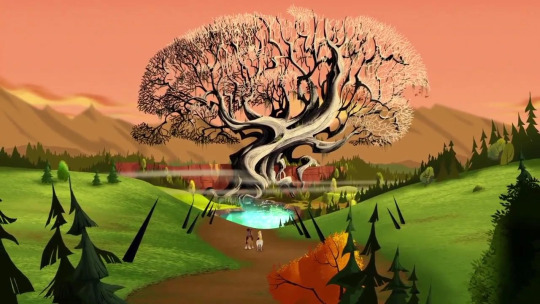
We’re now finally at the mid-season finale of season two, and it’s easily the best episode of this season. That however doesn’t mean that it’s not flawed, so here we go...
Summary: The group makes it to the Great Tree, only to be confronted by a new adversary: Hector, the brother of Adira, the most dangerous member of the Brotherhood; sworn to keep all from reaching the Dark Kingdom. Despite all that has happened, Rapunzel is determined to continue on toward the Dark Kingdom to uncover the truth behind her destiny. As they navigate through the Great Tree, Rapunzel discovers the Moonstone incantation which overwhelms the magical powers of the Sundrop in her blonde hair and causes injury and weakness to those around her.
The Brotherhood Is Such a Wasted Concept

We have a group of highly trained warriors, directly connected to the series main macguffin, who consider each other siblings, who all have conflicting goals, and they’re all severely underdeveloped to the point of ridiculousness.
For starters, in a show all about pushing sibling rivalries as parallels to the two main characters, it utterly fails to show the only other siblings who are actually connected to the plot acting like actual siblings.
Adira and Hector should be a parallel to Cass and Rapunzel in this very episode. One that actually ties into the narrative, yet outside of calling each other brother/sister/brethren they don’t act like family; even feuding family. Adira also fails to treat Quirin, Varian, Edmund, and Eugene as family. She shows no real concern for any of them despite saving her home (which would included her family) from the rocks being her main goal. She should be just as every bit as invested in saving Quirin as Varian. Which is yet another reason why Varian should have been S2 and another entry point for him in the show’s plot.
As for the rest of the Brotherhood, they never even interact at all. I don’t think anyone tells either Edmund or Hector what has happened to Quirin or Varian. And Edmund clearly didn’t inform Hector of Eugene, even though he logically should have. And did any of them know if Edmund was alive, despite Edmund having the means to communicate with the outside world with the crows?
What we’re left with is a bunch of holes in the story, because there’s now a bunch of holes in everyone’s motivations and their actions never quite line up.
And before you say, ‘well they’re not that important’, or ‘they’re aren’t meant to be a real family’; then that is in of itself a flaw because they should be. Not making them found family undermines Raps and Cass being found family, as it undermines every other sibling parallel in the show, and those parallels are the only build up we have to the sister reveal in S3.
It also undermines the moonstone plot and the whole reason why season two exists. Don't introduce things that connect back to your story and not make them important. In fact don't introduce unimportant elements in a plot driven show like this period.
Another Indication of the Timeline
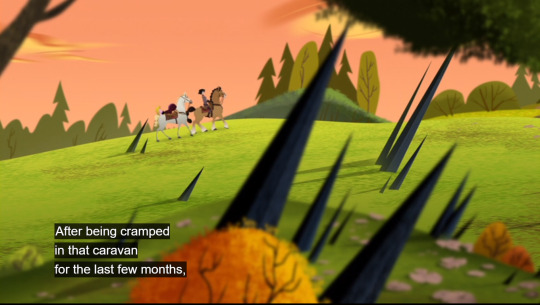
As stated before, Tangled is really bad at indicating the passage of time, despite the passage of time being a big plot point. We’re now a ‘few months’ past the island, which itself was 6 weeks, and before that it was several weeks to maybe even a few months before getting to the island...
So when does this take place? Well we were told that season two takes place over the course of a year by the creator, and that this is the mid-season finale so 6 months since SotSD sounds the most plausible. We also see fall trees dotted around like we did during the first half of season one. Which is the only visual indicator we get of changing seasons in the show, but it’s too understated to be properly noticeable most of the time.
However, the crew themselves can’t even seem to agree if Rapunzel’s Return is her birthday or not, so if you’ve heard conflicting sources, it’s because this shit wasn’t planned properly first. But all dialogue and visual cues point to the first half of season two being at least 4 to 6 months. With 6 being the most logical placement.
Just a Reminder, that Hook Foot Is Still Useless

If all you were going to have him do is whine like a child during the only plot important episode that he is in, then why not just replace him with an actual child?
It takes more work to leave Varian out of season two and force Hook Foot in his place, than it does just to write Varian in. There were so many potential entry points for his character, that the one they would up going with was the least natural to the characters and the story they were trying to tell. And even then, the Saporian take over they went with could still have worked had they handled things properly and pre-planned that stuff out.
But they didn’t. By all accounts S2 was a hasty re-write to get rid of Varian and Hook Foot was shoehorned in as his replacement at the last minute. And it’s the most utterly baffling creative decision I have ever witnessed in my life. There was zero logical reason for it.
This Plot Point Wasn’t Built Up Enough and It Goes Nowhere

Look, had they actually pointed out that Cass is a bodyguard now, and that this line from Raps threatens her career goals, that would make sense; or they could have explored the idea that Cass’s identity revolves around her job, and so feeling like her job is pointless makes her feel pointless therefore making her feel insecure about her future. Either of those would have been interesting jumping off points for her character arc and later conflicts.
But that’s not what they did.
I think that’s what they were initially trying to go for here, but it got muddled in the mess that was last minute rewrites.
Cass obtaining her goals in season one is ignored in favor of a bland and vague validation goal from this point onwards. Her issues with Rapunzel are then boiled down to be about; not identity, agency, class, or wanting a future, but into fighting over a dead mom and how one wasn’t ‘loved enough’ apparently. Which makes no sense given what we know of Cass from previous seasons.
Cassandra isn’t deep or complex; she is convoluted. The writing team couldn’t agree on what her goals and motivations should be, and so she performs conflicting actions throughout the story that actively undermines what was previously established and what she supposedly wants.
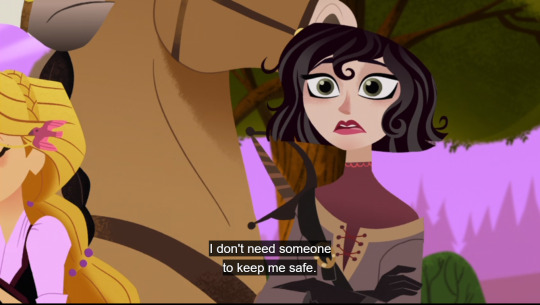
Most people who try to defend the writing for Cassandra do so with this idea that because they had to work hard to ‘connect the dots’ for all these seemingly disconnected plot ideas, means that of course the writing is ‘deep’ but that’s ignoring one of the basic fundamentals of writing.
The audience shouldn’t have to do the writer’s job!
Having to think about a story doesn’t mean that you need to go digging around for basic information like the character’s goals or what happened when. A writer’s job is to first and foremost clearly communicate ideas to their audience. Plot and character analysis is about finding extras like, metaphors, moral messages, and coming up with fun headcanons that don't impact the wider story. Because all of the bare bones information needed to understand the story should already be there for everyone to see.
If you gotta go into ‘analysis’ just explain the damn plot and why things are unfolding the way they do, then the story is badly written. Full stop.
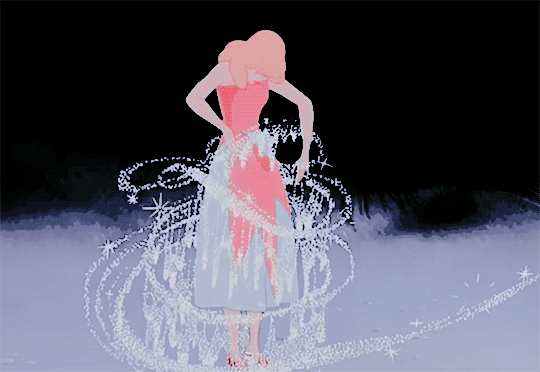
Cinderella wanting to go to the ball is a simple goal, but it’s an understandable one that anyone watching can grasp. You could go into a deeper analysis about abuse and what the ball symbolises for Cinderella’s character or how the story is an analogy for wider social issues at large, but at the end of the day everyone needs to be in agreement that, yes, Cinderella wants to go to the ball and we know why she wants to go, so that her actions in trying to get there make sense.
No one knows what Cassandra wants. Cassandra herself doesn’t know what she wants. So the ‘why’ part for what she does is never answered.
Hector Is Wasted
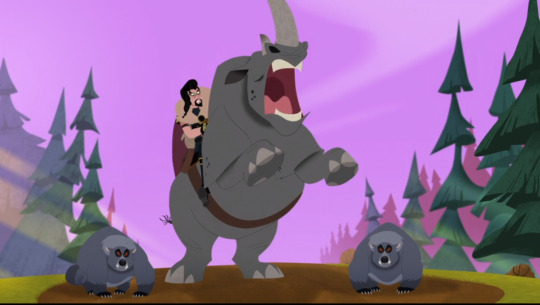
As already stated, all of the Brotherhood is wasted, but Hector more so than most. Season two desperately needed an ongoing threat, a main antagonist to push the story forward. Hector should have been that antagonist. Instead he shows up for this one episode, and then in a few non-speaking cameos in S3.
Then Why Not Just Stay With Them Adira?
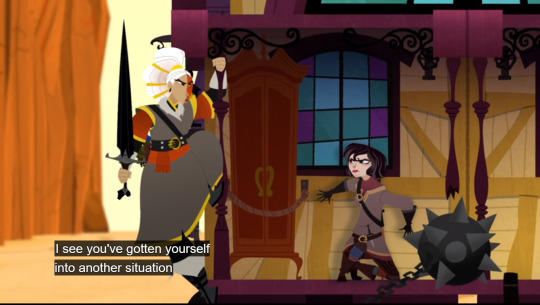
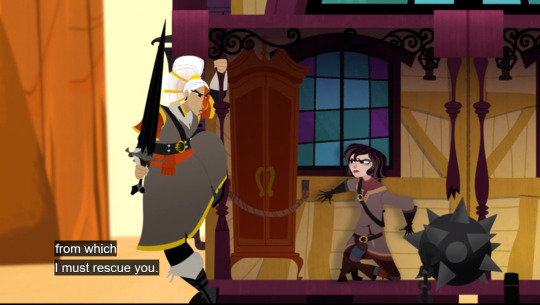
We’re never given an actual reason for why Adira keeps leaving the group, and indeed doing so conflicts with her stated goal of getting Rapunzel safely to the moonstone. It’s just shoehorned in here to create ‘mystery’, but mysteries have to be answered at some point. You can’t throw something in for drama’s sake and not explain why it’s there.
Lance’s Crush on Adira Isn’t Handled Well


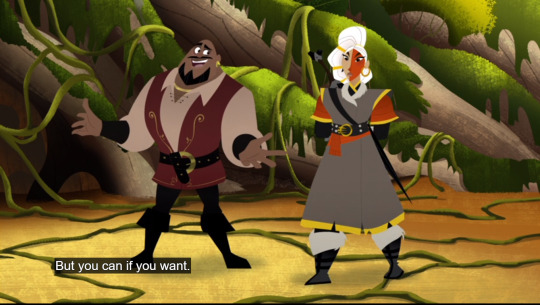
Look, this isn’t a judgment upon those who ship the characters. When I talk about relationships in the show I’m only talking about how well they are written on screen. I couldn’t care less what the fans do with them.
Even when I discuss my personal preferences for ships, that is all that is, my personal preference. I don't give a shit if you ship something that I may dislike, or if you hate something that I do enjoy. I’m a grown up with more important things to do than worry over what a bunch strangers may write on A03 about a bunch of fictional characters, and as someone who hates bullies above all else, I’ll defend your right to make whatever content to want to because censorship is just a form of bullying and nothing else.
No matter how gross or reprehensible I may personally find it. Different stories resonate with different people and for different reasons. I may debate your reasons, if the subject comes up, or critique professional media for the messages it puts out to the wider public, but I’ll never say you can’t like it or that you can’t make it.
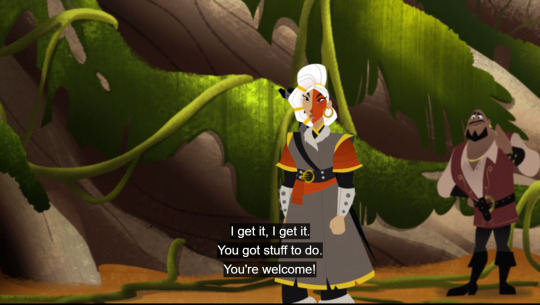
So with that stated, I don’t like Lance’s dynamic with Adira in the show and here’s my reasons for that.
She doesn’t ever return the feelings.
At best she tolerates him, at worse she actively kicks his butt when he gets too close, and most of the time she ignores him. Which is for good reason; she’s old enough to be his mom. Why would she be attracted to him?
Like I’m not saying that age gaps between adults are inherently wrong; I’m saying that if there is a significant age gap then you really have to work hard to build up a reason for why the two characters would go for each other when naturally they wouldn’t be in each other’s usual sphere of dating options. Which the series never does because once again Adira is clearly not interested in him.
This leads to Lance basically being an annoying ‘nice guy’ who can’t take a hint. Like constantly badgering someone who doesn’t want you to isn’t charming or endearing, and Lance is old enough to know this by now.
Basically the writers just took the Varian and Cassandra dynamic from Great Expotations and slapped it onto Lance and Adira despite the fact that it made zero sense for their characters. Lance isn’t a lonely teen who desperately wants to fit in and make a connection with someone. He’s not out to prove that he is mature, nor mistakenly believes himself to be an equal to the only other girl in the kingdom that has ever talked to him that isn’t already married/seriously dating and still living at home. Adira never comes around to considering Lance a trusted friend and confidante after shoving nearly everyone else away. She doesn’t seek out his help or approval, nor tries to build him up with compliments, ect, and so forth.
Now, I dislike the Cass and Varian ship for many, many reasons, but as they are presented on screen in the Great Expo it makes sense for why Varian would at first have an unrequited crush on her. Now after that QfaD he logically shouldn’t ever want anything to do with her but we’ll get to that later. That’s not the case with Lance and Adira; they’re both too old for such a dynamic.
To add on to the weird factor, they’re both related to Eugene. Adira is technically Eugene’s aunt, even if she never acts like it. Lance is also the closest thing to a brother Eugene has. They don’t recognize each other as such, so if you want to say their just friends or ship them or whatever, there’s wiggle room. But the end effect is like Maya in Girl Meets World crushing on her best friend’s, Riley’s, Uncle Josh. Only even with less basis, and it wasn’t that great there either.
Why Do you Suddenly Not Trust Adira Cass?
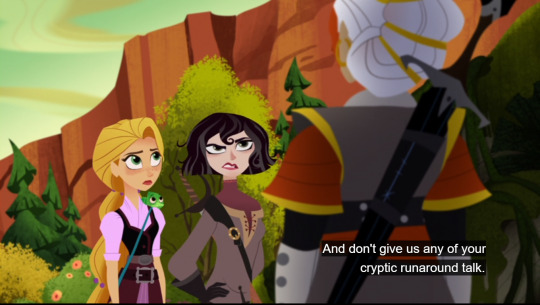
Forest of No Return was all about establishing trust in Adira, including with Cass at the end, so why the sudden back track? Especially since Adira hasn’t done anything but been honest with them, and has saved their butts several times now. All this does is make Cassandra look like an ass, which you don't need to be doing if you want the audience to side with her later on in the story.
Everyone Now Knows Quirin is a Part of the Brotherhood, So There’s No Excuse For Later
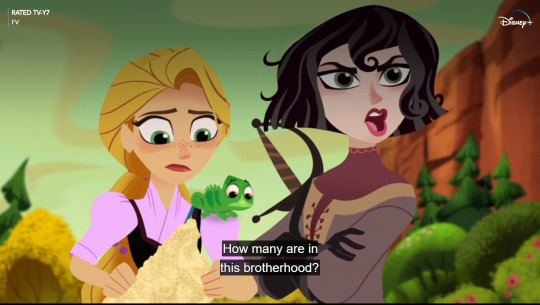
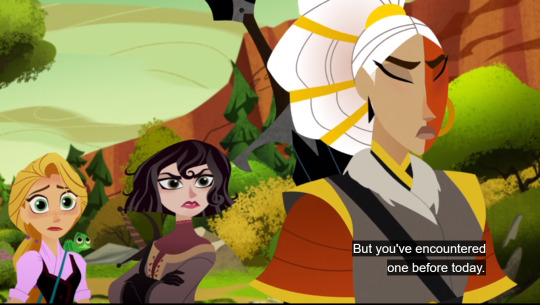
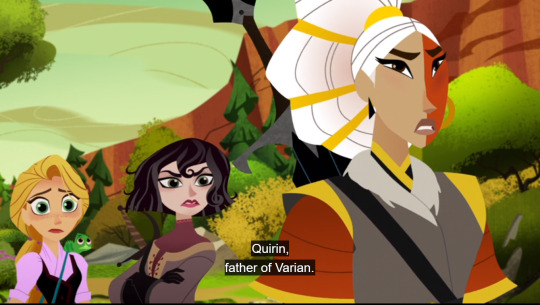
It’s an odd way to state that fact, but yeah, both Cass and Raps are told directly that Quirin is in the Brotherhood, and Lance, Eugene, and Hookfoot are also present and presumably listing to this exchange. So no one in S3 has an excuse to ignore this plot point until the finale.
This Backstory Goes Nowhere
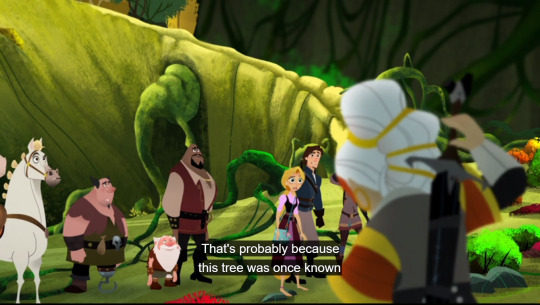

Adira launches into this story about Zhan Tiri, Demanitus, and the Great Tree and literally none of it actually matters. It’s never brought up again after this episode. We never get any insight into why they were fighting, how Zhan Tiri corrupted a tree, what significance the tree has outside of being really big and holding some scrolls, nor how the scrolls got there, why the tree is still connect to Zhan Tiri hundreds of years later, nor how Demanitus magic spear works or what it even does exactly.
Don’t introduce lore and then don't have it mean anything.
Why Do you Care, Cass?
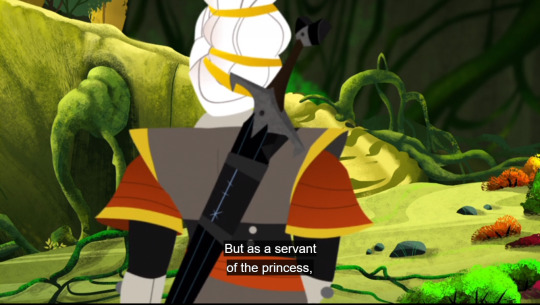
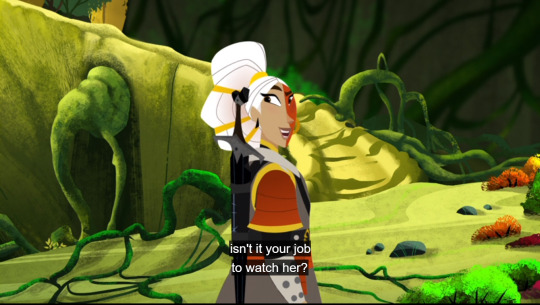


Cassandra isn’t a lady-in-waiting anymore. We’ve already established that back in Secret of the Sun Drop and in Beyond the Corona Walls. So why should she care if Adira calls her one? Adira isn’t from Corona. Adira isn’t in charge of anything. Cassandra doesn’t even like her, so Adira’s opinion shouldn’t matter.
This whole season we’ve seen Cass treat Adira like shit, but apparently we’re supposed to feel sorry for her when she can’t take clap back for all the grief she’s given. Is she really so immature that she can’t just ignore a petty insult for what it is? Why does she have to behave so insecure that she will jeopardize the mission or someone’s life over it? This is the deuteragonist I’m suppose to root for and relate to? I mean she’s twenty three for goodness sake! Grow the hell up woman!
Also while we on the subject, a royal guard and a lady-in-waiting are both servants. There’s no distinction between the two beyond what duties they perform, and that would be the case regardless of what job Cass had. Rapunzel’s a princess, everyone is her servant. That’s how the class system works, and by all means Cassandra enjoys more privilege than most people in Corona. She’s the Captain’s daughter, was granted next in line for that position in SotSD, and lady-in-waiting means to the princess means she’s above all the other maids except for Crowley and Friedberg. Cass may hate her job, but she hasn’t room to complain when Faith is right there and has things much worse.
In short making Cass suddenly indignant over being treated as lower class when she didn’t give a crap about the likes of Attila, Caine, Varian, Eugene, Lance, ect... just makes her look like a hypocrite.
The Other Reason to Dislike Lance’s Crush is That It Hinders His Development


Lance’s arc is that he’s suppose to learn to be more responsible. This episode in particular is suppose address his habit of lying... only it doesn’t. We get no real resolvement on this point. We also never see Lance progress enough to give up on Adira and stop pursuing her even when it’s directly pointed out to him that she doesn’t reciprocate his feelings. So in the end he still remains immature and irresponsible.
Though this conversation just proves that Eugene and Lance still have the healthiest relationship in the show. They’re about to disagree or call each other’s bullshit without resorting to insults or getting violent, which is more than what any relationship involving Cass does.
Questions With No Answers




We never learn why these scrolls are here, why they have the incantations on them and upon the wall, we don’t know who translated them, nor who came up with the incantations in the first place.
This is all important info that he series glosses over, because unlike the moonstone and sundrop, the incantations are things that someone had to have made at some point, and they could only have made them by studying what our plot macguffins are and how they work. Since the incantations are things that are also sought after by the big bad along with the magical objects, then we need to know how the big bad knows about them when no one else does. How they came about.
Which is yet another reason why we needed a magic system in place.
This Song is Catchy, But It Doesn’t Need To Exist
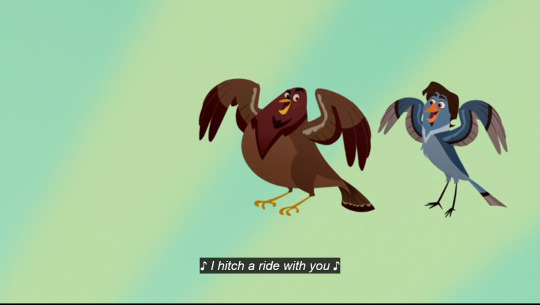
In a musical a song needs to either establish the plot, build the world, or further the characters. This song does none of those things, it’s not needed for Lance and Eugene’s relationship, it doesn’t actually resolve Lance’s plot as he is high when he apologizes for lying, and it wasn’t needed to established the man eating plant. I honestly think this song only exists so that the animators could just reuse assets they built to save on money.
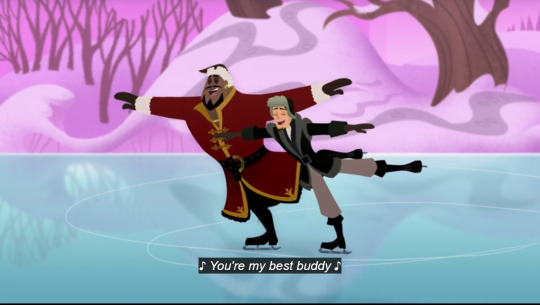
The Hurt Incantation Is the Coolest Thing In the Show! Shame It’s Not Utilized Well

People are suckered into this show by one of three things usually, ‘Let Me Make You Proud Reprise’, ‘Ready As I’ll Ever Be’, or this scene.
It’s shocking, powerfull, and a really, really awesome concept. It’s one of the best scenes in the show, and an interesting idea that offers up a lot of story possibilities.
Possibilities that’ll never actually be explored on screen. The hurt incantation isn’t useless, it does affect the plot, but it’s not used effectively. There was so much you could have done with this but it’s then never explored. Characters outright forget its existence even when they have no reason to, or it’s used to do things that should have been accomplished in other ways. It’s also never fully explained or expanded upon. They couldn’t even bother to give it more than one verse.
All of the incantations are mishandled in this show, but the hurt incantation is the one that has the biggest let down.
Conclusion
So that ends part 1, join me tomorrow for part 2.
#tangled#tangled the series#rapunzel's tangled adventure#anti-tangled#anti-cassandra#hector#the brotherhood#lance#adira
70 notes
·
View notes
Text
Brick Club 1.8.3 “Javert Satisfied”
I know this is technically a “good thing” since otherwise Valjean’s testimony would be for nought, but everyone except the prosecuting attorney agrees that Valjean is the real Valjean. I guess some part of me would expect for everyone to still think that Madeleine had gone crazy, or to somehow still be affected by the respect and veneration for Madeleine as mayor. But that’s not the case, and pretty much everyone believes that Madeleine really is Valjean.
Quick note that the lawyers also try to pull in all sorts of nitpicky bullshit to try and get Champmathieu indicted anyway, which courts still do today.
“This sentence, containing a great many ‘of’s, is the prosecuting attorney’s, written by his own hand, on the minutes of his report to the attorney general.” Maybe I’m wrong, but I feel like the comment on all the “of’s” goes hand in hand with the earlier critique of the provincial language of the courts.
“...although the judge was a kind man and quite intelligent, he was at the same time a strong, almost zealous royalist, and had been shocked when the mayor of Montreuil-sur-Mer, in speaking of the landing at Cannes, had said “the Emperor” instead of “Buonaparte.” A supposedly impartial person whose impartiality is a requirement for him to do his job well, actually be affected by his personal opinions and biases. I mean, that hasn’t changed in 150 years, that’s for sure. *cough Amy Coney Barrett cough* But it’s such a tiny little thing. Would the order of arrest be granted so quickly if the judge hadn’t caught that little honorific slip-up? It’s also just an example of the kind of knife-edge that things like someone’s life sits upon when in the hands of the courts. This is probably not the first case where a tiny, unrelated detail like that weighted the balance between life and death or freedom and prison for someone in this court.
Okay I don’t know anything about couriers and letter-sending and doing things quickly. If this is an official letter sent by courier, would that be one person riding horseback, without a carriage? Surely that would be faster than a horse pulling a vehicle? Especially since the deliberation went on for a little while after Valjean left the courthouse, and then the judge went in with the prosecutor, and then the letter was written and sent, but it got to Javert in M-sur-M soon enough that Valjean only had time to send his letter to Lafitte and briefly see Fantine. I’m just trying to figure out the timing of all of this.
“The buckle of his leather collar, instead of being at the back of his neck, was under his left ear. This denoted extraordinary agitation...For his collar buckle to be awry, he must have just had one of those shocks that could be called inner earthquakes.” I know the descriptions of Javert a few paragraphs later as being overjoyed means that this “agitation” is most likely shocked excitement, but I don’t know, something about this description is so weird to me. It’s the “inner earthquake” line, I think. That feels a lot more “negative” than excitement. Javert’s entire world has been shaken by this information. Perhaps it’s because this is so big. Really, it gets treated with such flippancy within the narrative, but a respected, well-known, charitable member of society in a mayoral position ends up being a wanted convict, and Javert was not only right about it, but right about it twice. That’s big for Javert himself, but it’s also big in general because it’s probably the first time Javert has ever uncovered something like this and been right about it and then told he was wrong and then proven right again. Plus the fact that he was hiding his convict identity the whole time while being a high-ranking, well-loved, leader of the community. Like, a “criminal” government official isn’t just corrupt in the usual way, he was fully a convict the whole time with a hidden identity and everything. It must be mind-blowing for him. And it’s interesting, Valjean is the only one who’s able to deliver multiple earthquake-status blows to Javert’s world throughout the book. (Valvert shippers, I’m starting to understand your perspective a lot more in this read-through than my last two.)
“...Javert turned the knob, pushed the door open as gently as a nurse or a police spy...” What an odd comparison to make. Nurse or police spy? Those are two incredibly disparate professions with totally disparate morals. Nurse implies a calm gentleness, a gentleness that is maybe nurturing or healing or at least positive in some sense. Police spy implies a much more cautious gentleness, one whose purpose is sneaky and definitely not positive towards those behind the door. How is Javert both a nurse and a spy? Unless he’s Harold Shipman, I’m not sure what to make of the connection to the nursing profession.
“Properly speaking, he did not enter. He remained standing in the half-open doorway, his hat on his head, his left hand in his overcoat, which was buttoned to his chin. In the bend of his elbow could be seen the leaden head of his enormous cane, which disappeared behind him.” Okay So this paragraph in context with the chapters before and after it are really interesting. He doesn’t enter the room at first, just stands in the doorway. He only enters the room after both Fantine and Valjean have noticed him. I’m sure there’s a good horror movie example out there, but it’s like he’s not allowed to enter until he’s noticed. Like he’s not allowed to exist for others until they see him. Does that even make sense?
“There is no human feeling that can ever be so appalling as joy. It was the face of the devil who has just regained his victim.” Man, I like the Hapgood translation of that second sentence so much better: “It was the visage of a demon who has just found his damned soul.” Like, it’s not Javert who has singularly persecuted Valjean (I mean it is, but not really), Valjean isn’t Javert’s victim. Valjean is persecuted by society, Javert is just there to collect someone already marked. He’s not the only one doing the marking. So I like the symbolism of a demon collecting a damned soul.
“Javert’s satisfaction radiated from his commanding attitude. The deformity of triumph spread across his narrow forehead. It was the full quotient of horror that only a gratified face can display.” I love this chapter for its bizarre contrast of ugliness and grandeur. Everything Javert does in this chapter is this gross, twisted version of divine justice. His joy, which should be a beautiful and pure emotion, is perverted by its circumstance. And the description of how scary a satisfied face can be is so good because it’s so viscerally descriptive. You see that exact face on every video of a cop being a racist, condescending, sanctimonious, power-hungry cunt to people on the street. That face of “I’m better than you and I have power over you and there’s nothing you can do about it so ha ha I win.” It’s more evil than antagonists who know they’re evil because Javert fully thinks that his actions and thoughts are right. And Hugo points it out here. Triumph and glee for the wrong reasons doesn’t make a person beautiful, it deforms them.
I actually love the description of how joyful Javert is because it’s clear that this is personal for him. When he arrested Fantine and sat down at his desk to write out her sentence as a one man judge-jury-executioner, he wasn’t gleeful like this. He wasn’t sad about it, he just was. He was doing a duty and Hugo even says that he was very thoughtful about it and spent time cataloguing what he saw in order to decide what to do. This isn’t the same type of detached judgement and condemnation. This is fully personal glee at being able to be vindicated.
“At that moment Javert was in heaven. Without a clear notion of his own feelings, yet with a confused intuition of his need and his success, he, Javert, personified justice, light, and truth, in their celestial function as destroyers of evil. He was surrounded and supported by infinite depths of authority, reason, precedent, legal conscience, the vengeance of the law, all the stars in the firmament; he protected order, he hurled forth the thunder of the law, he avenged society, he lent aid to the absolute; he stood erect in a halo of glory; there was in his victory a trace of defiance and combat; standing haughty and resplendent, he displayed in full glory the superhuman beastiality of a ferocious archangel; the fearful shadow of the deed he was accomplishing, making visible in his clenched fist the uncertain flashes of the social sword; happy and indignant, he had gnashed his heel on crime, vice, rebellion, perdition, and hell, he was radiant, exterminating, smiling; there was an incontestable grandeur in this monstrous St. Michael.”
I have multiple things to say about this passage so I think I’m going to break it all down into different paragraphs because there’s A Lot of different things in my brain.
First of all this is an echo--this time righteous and vindicated--of Javert’s feelings from 1.5.13. Madeleine lets Fantine go and Javert has this thought: “Or, in view of the enormities he had witnessed over the last two hours, was he saying to himself that he had to resort to extreme measures, that the lesser had to make itself greater, for the detective to turn into a magistrates, the policeman become a judge, and that in this shocking turnabout, order, law, morality, government, society itself, were personified in him, Javert?” In 1.5.13, Madeleine’s authority overruled him, protected Fantine and humiliated Javert. In 1.5.13, he is forced to accept defeat. Now, he has all of the authority, all of law and reason and justice behind him because Madeleine no longer has that same power. Javert is again the personification of justice, law, society itself, but there is not Divine Authority to stand up for Valjean as there was for Fantine. Javert is vindicated here for his earlier humiliation, with all levels authority backing him up this time.
“Without a clear notion of his own feelings, yet with a confused intuition of his need and his success, he, Javert, personified justice, light, and truth, in their celestial function as destroyers of evil.” Okay hold on wait. In 1.5.13, Javert has a moment of nearly breaking the fourth wall, nearly deciding that he needs to become a Symbol in order to restore the balance of authority and justice that he feels Madeleine has knocked askew. He is very much aware of his potential to personify Law and Justice etc. But here Hugo says that he does all of this with ���confused intuition” and without a clear idea of how he feels. Interesting that when he is conscious of being able to become a symbol, he is prevented from doing so, but when he actually becomes a symbol, he’s unaware of it. Also, here’s another moment of Javert clearly Feeling Something but not fully understanding it, again a thing that only Valjean seems to provoke in him. (Oop more Valvert fodder.)
I don’t really know what to make of the superiority complex that Hugo describes here. Obviously Javert thinks that he is righteous and that he is doing a Great And Grand thing and that he is avenging society by ridding it of the scourge of the evil deceiver convict Jean Valjean. But the way Javert’s righteousness is describes feels like almost more of a “nanny-nanny-boo-boo” feeling. Is your righteousness truly righteous if you’re feeling personal satisfaction and personal superiority about it?
Javert is literally the Angel Of Death here! I know in my last post I talked about Javert as the grim reaper entering the room. His comparison to St Michael confirms this. Michael is a seraph, which are winged celestial beings with a fiery passion for doing God's good work (which is interesting to me considering how much Valjean’s symbolism is associated with fire). In Roman Catholicism Michael is the Angel Of Death who descends and gives the person the chance to redeem themselves before dying. He is also the one who will weigh people’s merits on Judgement Day. Except! Javert is Michael without mercy or patience! He judges without allowing a chance for redemption. We saw this in 1.5.13 when he sat down and wrote out Fantine’s sentence while she simultaneously explained her situation and begged for mercy. We see it now. Javert as St Michael is “monstrous,” he is the St Michael that defeated Satan, not the healing protector Michael. We even have the sword imagery. Michael used the sword to best Satan in battle; except this time the sword is “social” and to Javert at this moment, Valjean is the personification of Crime-As-Satan.
(Side note: something I love about Javert is that he as a human being isn’t really portrayed as an avidly religious person, at least not in the ways that Valjean or the bishop are portrayed as religious people. But his symbolism sure is religious. I think that’s one of the drastic differences between book Javert and stage Javert. Stage Javert is portrayed as a religious person but his symbolism is more human.)
“Probity, sincerity, candor, conviction, the idea of duty, are things that, when in error, can turn hideous, but--even though hideous--remain great: their majesty, peculiar to the human conscience, persists in horror. They are virtues with a single vice--error.” Hugo’s thought about duty done in error is so interesting. He says something similar when talking about Problem of the monastery: “To mistake a grave error for a duty has a grandeur of its own.” For Hugo, the fact of having such strong conviction alone is a grand thing. Having conviction, having a sense of duty is always a good thing--the error is not in the sense of duty itself but in what that allegiance might be to. The virtues of duty or honesty or conviction are by themselves inherently good, but they can be misused and misinterpreted and made wrong.
(Side note: This is actually a really interesting thought re: Grantaire! Hugo holds not just having beliefs but having faith in and conviction about your beliefs in such high regard. Which makes Grantaire, who is conviction-less and faithless, in the midst of all these people who are so loyal and committed to their beliefs and ideals, not a mild contrast but a massive one.)
“Without suspecting it, Javert, in his dreadful happiness, was pitiful, like every ignorant man in triumph. Nothing could be more poignant and terrible than this face, which revealed what might be called the evil of good.” God I love this line. “The evil of good” is a concept that really, really, really needs to be common usage. I feel like this line specifically really needs some in depth analysis but also I don’t really know what to say about it except that it’s just so true. Regarding Javert being “pitiful” in his happiness, this kind of reminds me of Mme Victurnien? Both think they’re doing a “good thing” and their deeds ruin lives; their triumph and feelings of righteousness are pitiful for this reason. Again, it’s the equivalent of a “ha ha I win” bully moment, but with much worse consequences. Man, I feel like this chunk needs more analysis than this but I don’t know what to give it.
11 notes
·
View notes
Text
NOTES FROM WATCHING THE FIRST EPISODE OF “RIVERDALE”
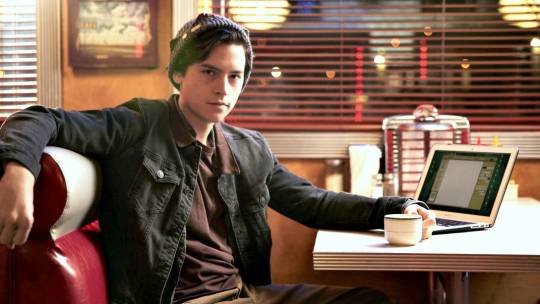
1. Riverdale is a bizarre town that seems cut off from everywhere else, temporally straddled between an eternal 1950’s—more accurately a 1950’s stuck in an endless repetitive loop. But it takes place in the late 2010’s. Even so, the decor in the town is vintage, and the characters recognize this. The activities of the kids are vintage. the internet and cell phones exists, millennials are named, but it doesn’t seem to matter. something is very weird here, as if all these people are ghosts. all the stock scenarios and characters are here, which is to be expected for a teen drama, but there’s an exactness, a literalism, that is too perfect to be unintentional. 2. what is this world? it seems to be a staging of a certain inertia in american culture, which changes in superficial ways—technology, new TV shows, music new taboos—but all if this somehow serves to reinforce, or justify a return to the “leave it to beaver” universe. 3. any reminder that these are modern kids—their frequent references to contemporary TV shows like Mad Men for instance—only serve to increase the spooky vibe. everyone in this town seems to be low key crazy, making the show feel like twin peaks but written by what’s left of your local shopping mall. 4. the show’s script is constantly making fun of itself to the point that we seem directed by it to avoid taking the drama seriously—it is perhaps a smoke screen, like the haze of the presumably northwestern woods that seem to surround the town (it is filmed in Vancouver). the gay best friend is named as the gay best friend, establishing him as a living archaism—i felt bad for him after this. 5. plot points are shown to be cliche—the fake lesbian kiss, once scandalous in the 2000’s, is brushed off as false and an erasure of real lesbians. the script fools us, indicating it means to aim for more intelligent territory. and yet, veronica’s confrontation with cheryl, her tough girl speech, where she reveals her vulnerability as a rich girl fallen from grace but also stands up for betty—this goes without an ironic comment, even thought it is also a cliche, but a more contemporary oneq—the “mic drop” moment. so we see how the naming of particular cliches, employed ironically, serves to hide others the show is earnestly employing. 6. veronica says she needs to be redeemed for her father’s crimes, how is that fair. 7. archie’s desire to make music seems like a stand-in for a recognition that he’s gay. they cover this up by making his character straight but i don’t buy it. because his music itself clearly doesn’t matter. this is similar to the dead poets society where the kid kills himself obviously because he’s gay and he’s afraid his dad will disown him. why? nobody kills themselves merely because their dad shames them for doing theater. the reason is simple: theater is already such a humiliating and abject thing to love that you have to be totally shameless to even start doing it. once you become a theater kid your dad has lost you. in the second episode, the gay friend of betty reveals that he agrees with me here. 8. archie is the decentered center of the show, not a particularly interesting character so much as a holding container for female desire/fantasy. he’s dumb, cute boy who’s kind of artistic and kind of jockish, but the complex psychology belongs to betty, veronica, cheryl so far—all plotting, calculating characters, whereas archie just wants to enjoy himself and be liked—and to be fair, these shallow needs get him in plenty of trouble, but they’re simple needs. but this is always what archie was, even as a comic book character. he’s kicked around like a football like a more jocular charlie brown. 9. archie’s problem is identiied as the problem of "all millenial men", who need to be told what they want—but this is really everyone’s problem. what makes the girls/women different is that they don’t care that they don’t know what they want—they just act on feelings, and try to make the world match up with the feelings. archie thinks he ought to know what he wants, and then do it. but the women, whose desires as women are not even encouraged from day one, are free from this tedious problem. this is why archie is the one who has to be the moral authority regarding his mutual witness to the murder with the hot teacher, while the hot teacher is only afraid people will find out she fucked a student. veronica brushes off archie’s identity crisis as a false dilemma, critiqueing the categories of “jock” and “artist” and insisting he can be both, and anyway who gives a fuck? but this whimsy and indifference toward boundaries can get devious with veronica, who is betty’s friend one second and hooking up with archie the next. 10. although women are still often denied full subjectivity in literature, in real life it’s always been the opposite—men tend to forego personality development in favor of power or the illusion of power, and end up more shallow, rigid and fragile, more prone to the whims of their entourage. they never really have to become anything in particular--masculinity functions like a hive mind. if male relationships superficially appear to have less friction, it is only because men are brutally conformist and end up with little personal to argue about, usually coalescing around some common interest and not prone to discussing their respective inner lives--except, occasionally to defensively deny their existence. so-called "sensitive" men only do this in more devious ways--it's obvious that jughead is the most devious character we've met so far. women, in contrast, are each a hive mind unto themselves, compelled to construct an array of selves, carefully deploying them to get by in a world structured by the male gaze and booby-trapped by the machinations of other women. this complexity is of course terrifying to men who either submit to it as a fetish or suppress it— and one way of accomplishing that suppression in literature is to create stories where the men are supposedly complex and the women supposedly shallow and dependent wholly on men--the typical gaslight job of the mediocre male writer. this is clearly a show that, whatever its other blindnesses, is not going to let that happen. 11. we are told through veronica that archie is more dangerous than he looks. why doesn’t the show want us to figure this out ourselves? this feels ironic on the writers' parts, another winking use of cliche. 12. everyone’s problem is a cliche—archie’s father pressures him to do sports to get into college, he wants to do something else. betty’s mom is controlling and betty is a people pleaser who already in the first episode explodes about how perfect she has to be all the time and can’t she just do something for herself for once? 13. the music is annoying and cloying but it also grounds the contemporary nature of the show, because of its peculiar sense of melodrama, which is endemic to this time period, and the neoliberal overvaluing of the self. 14. the video on this show seems filtered into oblivion, or photoshopped or otherwise conspicuously treated. just like the self-awareness of the script, it contributes to the sense of unreality. 15. more self-aware cliches: archie and betty grew up next door to each other—they’re stuck in a feedback loop of being the ____ next door. cheryl describes herself as the queen on stage at the dance. 16. classic literature is referenced oddly—betty loves toni morrison, even though by the end of the episode, we have been introduced to zero black main characters. is this self-aware critique of white fetishization of blackness? and there's also thornton wilder’s “our town”… veronica suggests that the high school is part of the lost epilogue from “our town”—wilder also presented a transparently fake and timeless town to stage his existentialist story in, one in which horrifyingly, dead people remain in a liminal space between death and life, vainly trying to communicate with the living they can still see. 17. every celebrity/media reference is bizarre. a thin veneer draped over an unchanging reality. "Riverdale" seems not so much about the dark underbelly of suburbia, but about the idea of suburbia is the dark underbelly itself. a murder has to happen because someone has to bring death here, lest everyone become paralyzed by their immortality. 18. archie’s “making a deal” with the hot teacher is way more erotic than anything he’ll do with b or v… why is this happening at the Dance lol, unless we are to read it this way? they have shared the most precious thing in this town, death... why does archie love the teacher and toy with his peers? because they can't give him death. clearly archie is blackmailing the hot teacher into continuing the relationship, but he does so seemingly unaware of his own motives. he lives in the age of youtube tutorials, he doesn't need music instruction. and here is another paradox of the modern gender binary--men think they don't know what they want, but unconsciously they know what they want--they receive their instructions from the Borg Queen of masculinity and pursue it ruthlessly, whereas women end up thinking they know exactly what they want, but unconsciously they don't, because it's fractured amongst their afformentioned hive of selves. This is why both traditonally-socialized genders are completely right in saying the other is full of shit. 19. “we have no past” goes the song josie sings—and maybe this is america’s problem—the past is empty, the past of ordinary suburbia, interrupted only occasionally by wars perhaps but untouched by cultural progress—and because we have no past we can have no present, only an empty recycling of the same void, the same problems, the same catharses—new episodes of the same show. we live forever at the cost of never changing. is riverdale a socially critical prestige drama LARPing in the ironic costume of a CW teen soap??? 20. all the characters are trapped in a carnival haunted house ride. the theme: adolescence. 21. cheryl’s party—brett kavanaugh could have been at this party 22. jughead is the narrator, and i like the idea that this is all in jughead’s head, which is why it’s so unstuck in time aesthetically, so stylized and knowing. and it's no wonder he's the most popular character, because he represents the writers themselves, and fandom is to have an illusion of a privileged relationship not so much with the characters, but with the property's creators--and to be hyperinvested and, if necessary, hypercritical of their choices. 23. the gay hookup is interrupted by the presence of a corpse—a classic trope in teen horror but it’s interesting to see it with a gay pair. it’s as if in the clash between the perpetual 1950’s aura and the contemporary references and morality, a gruesome surplus appears, the specter of homophobia. which, incidentally is a corpse of a man guilty of a sexual act that is still considered taboo—incest. a corpse symbolizes the death of innocence for a hetero couple, but for a queer couple it can’t just be that—it also must evoke the threat of actual murder. which makes this a very different moment. 24. jughead says riverdale has changed—but it has only been revealed to be what it always was—"full of shadows and secrets", as jughead puts it. he must be putting us on—this place is way creepier than Sunnydale, and that place had actual demons… but this is often what a change amounts to—not the addition of a new trait, but the acceptance of one that was already there. 25. jason blossom is a ginger like archie and he therefore seems tied to archie in a unique way. he dies on july 4th, given some fuel to my reading as a show with something to say about america’s self-image. 26. all the parents are single parents or in strained, unhappy marriages in this town. this us realistic, but that should tip us off: what in the show has been realistic so far? debuting in january 2017, "Riverdale" seems retrospectively shaped by the trump era-a teen drama not about the undead, as buffy was, but a teen drama which is itself undead, fitting for a president who also wished to raise the dead, and also what had never lived. riverdale’s preservation of the old “great” america is superficial—indoors, a very contemporary isolation and alienation reign, in contrast even to the desperation of actual 50’s suburbia. 27. is everyone dead already in this show? is riverdale purgatory? is that what explains its being unstuck in time and drenched in fog? but i’ve been to small towns in the northwest that look like riverdale—nothing has been updated since 1954. in order to seem fake, riverdale has to be even faker that real life, even more uncanny—and that’s a tall order.
8 notes
·
View notes
Text
1 am in the morning and done with the Prime Wars Trilogy!
Before watching them I always got the impression from the fandom that the shows are bad and I don’t get why? I loved it! Combiner Wars was a little wacky because it didn’t really explain much but was still good given how short it was, Titans Return was really gearing the plot up and was captivating with it’s immidiate threat from Tripticon and Power of the Primes was EPIC! Was at the edge of my seat for the whole ride! I saw some youtuber making videos on why at least Combiner Wars and Titans Return are supposedly bad and I’d be willing to watch them to see what critique points he has, but I didn’t really like his RiD15 video really much either, so...gotta see. And if the negative points are: 1. Voice acting quality 2. cinematography 3. The lack of natural facial expressions 4. Whyever the fuck everyone’s head always bobbed when talking Like all these non-plot-related reasons I see and agree with. While the animation style was pretty and some shots and fights were quite neat, the overall animation was kinda lame and didn’t really give you much feeling. Same goes with the facial expressions - a lot of times, especially with Megatron, the characters have a model expression that gets moved, and at times it slips back to that model expression that is mostly a smile. And characters smiling when the situation doesn’t call for it is jarring. And while the voice actors were able to give characters life, most of them failed to be truly expressive. Like the flashback scene where Megatronus mourns Solus’ death, the voice actor for Megatronus really failed to give it a good performance worthy of such a tragic scene. And at times I didn’t truly understand what the characters were even saying, because they didn’t speak clear enough. That was the most annoying with Hot Rod. And they all spoke really slow for some reason. And I give it that, the pacing was weird a lot of times, especially during fights scenes. When you’d think everything should go really fast, there were always pauses for certain characters to do plot-stuff that needs to be done, or to have a lil chit-chat. Like that is one point that the people could have done a better job. But everything else...I dunno, I kinda forgive it. I don’t know much about Machinima to judge it based on who did the show, how much budget and resources the shows even had. Might be because I usually don’t judge shows much for their animation, I am far more interesting in the plot and characters to really care about the technical things. And while good animation and voice acting and so on does get a plus point from me, bad animation doesn’t bother me much. Like come on, G1 is still my favourite, okay, and we all know what an animation mess that is. Voice work is a little different, I do care when it’s bad because the quality of the acting really influences the emotional impact of the character. But it wasn’t too bad in the Prime Wars, and some were really good, like Windblade. Talking of Windblade, this is the first show were I really, really liked her! Cyberverse didn’t warm me up to her and neither did RiD15 really. And I can say the same for a lot of characters here, Megatron was DREAMY! Gosh I loved him so much here! <3<3<3 Hot Rod gave me too many feels, Victorian was awesome, Percy a cutie pie and damn, Overlord was a treat! And Primal was a really nice addition, I really digged the cast here! It might not have been as deep as it could have been, but the show was short and so were the episodes, I can forgive that. And as a show with just 18 episodes in total, it gave me a better experience than other TF shows! But damn, if you have any idea why the show doesnt seem to be good, let me know, I’ wanna know what others think!
#transformers#prime wars trilogy#combiner wars#titans return#power of the primes#transformer posting#transformer rant
8 notes
·
View notes